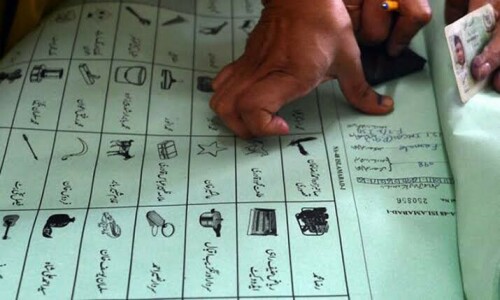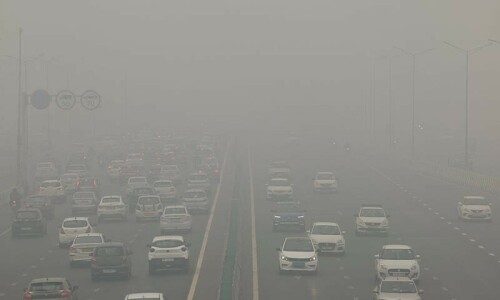ISLAMABAD: The Pakistan Peoples Party (PPP) on Friday called upon the Election Commission of Pakistan (ECP) to withdraw its decision to deploy troops inside polling stations during the by-election in NA-205, Ghotki, to ensure “free and fair” election.
The opposition party also asked the ECP to explain why the by-poll, which was earlier scheduled for July 18, would now be held on July 23.
At a press conference, PPP secretary general Farhatullah Babar and another leader Syed Nayyar Hussain Bukhari urged the ECP to reconsider its decision to deploy troops inside the polling stations in Ghotki.
Mr Bukhari said the election in Ghotki had already been postponed for five days as initially it was to be held on July 18, but it would now take place on July 23.
“Holding elections is the sole responsibility of the Election Commission and the army should not be deployed within the polling stations,” he said.
Mr Babar wondered how an election could be called free, fair and transparent when the voting was conducted under the gaze of troops having guns slinging over their shoulders.
He said that a state-run news agency had reported that there were a total of 289 polling stations in NA-205, out of which 125 had been declared extremely sensitive and 164 sensitive, which meant that every polling station would be manned by troops.
“Law and order situation in Ghotki is far better than tribal areas of the country where elections are also being held, but troops will stay outside the polling stations there,” he said.
“The PPP is surprised over this decision. Even in elections in tribal areas, not all polling stations have been declared sensitive despite the fact that recently the area was termed ‘Petri dish of international terrorism’, but all the polling stations in Ghotki have been declared either extremely sensitive or sensitive where troops will be deployed inside the polling stations,” he added.
Mr Babar expressed gratitude to the ECP for accepting the demand of the PPP and withdrew its earlier decision under which troops were to be deployed inside polling stations in the erstwhile Federally Administered Tribal Areas (Fata).
He said that declaring polling stations sensitive was obviously based on reports of state’s security agencies. “It is apprehended that some agencies may have deliberately created misperception of exaggerated security threat in Ghotki to justify posting of troops inside polling stations. If that is the case then it will raise serious questions on the conduct of July 23 poll in Ghotki,” he said.
Mr Babar said that the PPP was opposed to the presence of troops inside polling stations anywhere, any time. He urged the ECP to reconsider its decision to deploy troops inside the polling stations in NA-205.
Published in Dawn, July 20th, 2019















































